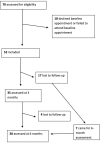Feasibility, acceptability and preliminary outcomes of a mindfulness-based relapse prevention program in a naturalistic setting among treatment-seeking patients with alcohol use disorder: a prospective observational study
- PMID: 31154307
- PMCID: PMC6550005
- DOI: 10.1136/bmjopen-2018-026839
Feasibility, acceptability and preliminary outcomes of a mindfulness-based relapse prevention program in a naturalistic setting among treatment-seeking patients with alcohol use disorder: a prospective observational study
Abstract
Objectives: Cultural differences between the USA and France led us to examine the feasibility, acceptability and preliminary efficacy data on craving, quality of life and psychological flexibility of the add-on Mindfulness-Based Relapse Prevention (MBRP) programme in alcohol use disorder (AUD) in France.
Design: We conducted a prospective observational study with a 6-month follow-up.
Setting: The study was performed in a naturalistic setting with adult outpatients from an addiction department.
Participants: We included all patients with a current AUD who participated in the MBRP programme (n=52). There was no non-inclusion criterion.
Interventions: The intervention was an 8-week MBRP programme, combining elements of traditional relapse prevention cognitive behavioural therapy and mindfulness meditation training. This was an eight-session closed-group programme.
Primary and secondary outcome measures: Primary outcomes were the number of attended treatment sessions, home practice frequency and dropout rate. Secondary outcomes were changes in craving, quality of life, psychological flexibility, drinking outcomes, depression, anxiety and mindfulness levels.
Results: The average number of completed sessions was 6.6 (SD: 1.9). Most participants introduced mindfulness meditation into their everyday lives: 69% and 49% of included patients maintained formal practice at 3 and 6 months, respectively, and 80% and 64% maintained informal practice at 3 and 6 months, respectively. Most participants used mindfulness techniques to face high-risk situations (56% at 6 months). Participants reported a significant reduction in craving, days of alcohol use, depression and anxiety and an increase in mindfulness and psychological flexibility at 6 months.
Conclusions: The MBRP programme showed good acceptability and feasibility. MBRP seemed to improve craving, mindfulness and psychological flexibility. Comparative studies are needed to evaluate the programme's efficacy in AUD.
Trial registration number: 2200863 v 0.
Keywords: MBRP; alcohol use disorder acceptability; craving; mindfulness; relapse prevention.
© Author(s) (or their employer(s)) 2019. Re-use permitted under CC BY-NC. No commercial re-use. See rights and permissions. Published by BMJ.
Conflict of interest statement
Competing interests: H-JA has received sponsorship to attend scientific meetings, speaker honoraria and consultancy fees from Bioprojet, D&A Pharma, Ethypharm, Lundbeck, Merck-Serono, Mundipharma, Novartis and Pfizer. LR has received sponsorship to participate in scientific reaserch funded by PMU and FDJ through a convention with the University Paris Ouest Nanterre la Défense. AB has received sponsorship to attend scientific meetings, speaker honoraria and consultancy fees from Bristol-Myers-Squibb, Lundbeck, Merck-Serono and Mylan and is member of the invidor board. AL has received sponsorship to attend scientific meetings, speaker honoraria and consultancy fees from Lundbeck and Indivior.
Figures
Similar articles
-
Mindfulness-based relapse prevention combined with virtual reality cue exposure for methamphetamine use disorder: Study protocol for a randomized controlled trial.Contemp Clin Trials. 2018 Jul;70:99-105. doi: 10.1016/j.cct.2018.04.006. Epub 2018 Apr 19. Contemp Clin Trials. 2018. PMID: 29679670 Clinical Trial.
-
Neuromodulation and mindfulness as therapeutic treatment in detoxified patients with alcohol use disorder.BMC Psychiatry. 2024 Sep 27;24(1):635. doi: 10.1186/s12888-024-06085-4. BMC Psychiatry. 2024. PMID: 39334026 Free PMC article.
-
[Mindfulness-based-relapse prevention (MBRP): Evaluation of the impact of a group of Mindfulness Therapy in alcohol relapse prevention for alcohol use disorders].Encephale. 2015 Dec;41(6):521-6. doi: 10.1016/j.encep.2015.05.003. Epub 2015 Jul 6. Encephale. 2015. PMID: 26159682 French.
-
Retraining the addicted brain: a review of hypothesized neurobiological mechanisms of mindfulness-based relapse prevention.Psychol Addict Behav. 2013 Jun;27(2):351-365. doi: 10.1037/a0029258. Epub 2012 Jul 9. Psychol Addict Behav. 2013. PMID: 22775773 Free PMC article. Review.
-
Mindfulness-based Relapse Prevention for Substance Use Disorders: A Systematic Review and Meta-analysis.J Addict Med. 2017 Sep/Oct;11(5):386-396. doi: 10.1097/ADM.0000000000000338. J Addict Med. 2017. PMID: 28727663 Free PMC article. Review.
Cited by
-
Associations between relapse and drinking behaviors in patients with alcohol use disorders: A 6-month prospective study.Neuropsychopharmacol Rep. 2023 Dec;43(4):633-640. doi: 10.1002/npr2.12405. Epub 2023 Dec 9. Neuropsychopharmacol Rep. 2023. PMID: 38069609 Free PMC article.
-
Comparing the Efficacy of Mindfulness-Based Relapse Prevention Versus Relapse Prevention for Alcohol Use Disorder: A Randomized Control Trial.J Stud Alcohol Drugs. 2023 Jul;84(4):560-569. doi: 10.15288/jsad.21-00392. Epub 2023 Feb 1. J Stud Alcohol Drugs. 2023. PMID: 36971735 Free PMC article. Clinical Trial.
-
Mindfulness-Based Interventions for the Treatment of Aberrant Interoceptive Processing in Substance Use Disorders.Brain Sci. 2022 Feb 17;12(2):279. doi: 10.3390/brainsci12020279. Brain Sci. 2022. PMID: 35204042 Free PMC article. Review.
-
Effectiveness of Mindfulness-Based Relapse Prevention in Individuals with Substance Use Disorders: A Systematic Review.Behav Sci (Basel). 2021 Sep 29;11(10):133. doi: 10.3390/bs11100133. Behav Sci (Basel). 2021. PMID: 34677226 Free PMC article. Review.
-
Biological mechanism study of meditation and its application in mental disorders.Gen Psychiatr. 2020 Jul 13;33(4):e100214. doi: 10.1136/gpsych-2020-100214. eCollection 2020. Gen Psychiatr. 2020. PMID: 32695961 Free PMC article. Review.
References
-
- McLellan AT, Lewis DC, O’Brien CP, et al. . Drug dependence, a chronic medical illness: implications for treatment, insurance, and outcomes evaluation. JAMA 2000;284:1689–95. - PubMed
Publication types
MeSH terms
LinkOut - more resources
Full Text Sources
Medical



